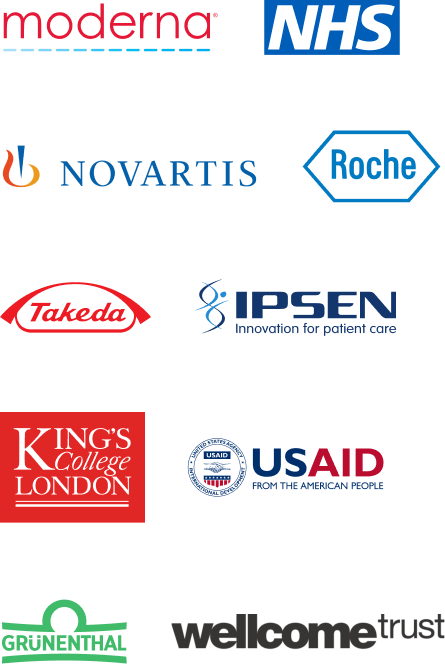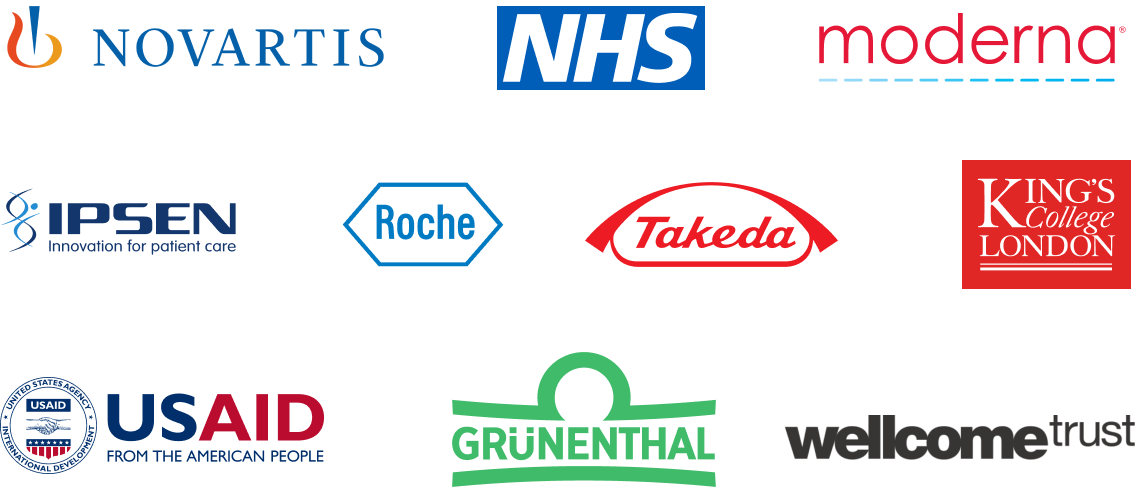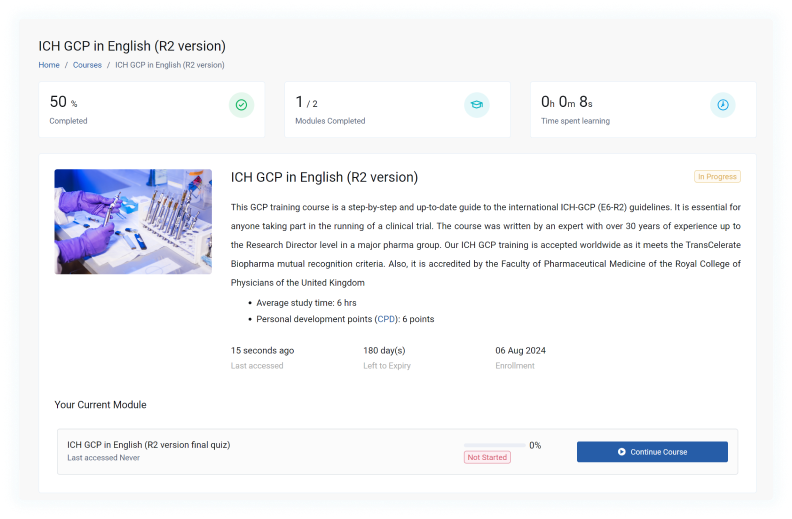Course Syllabus
- Introduction
- What is GCP?
- Why is ICH GCP Important?
- The Principles of ICH GCP
- Additional Learning Points
- Documentation and Version Control
- Quality Assurance (QA)
- Key Resources
- Introduction
- Responsibilities of the CA
- Responsibilities of the IEC
- Subject Informed Consent Forms (ICF): Part 1
- Subject Informed Consent Forms (ICF): Part 2
- Composition, Functions, Operations, Procedures, and Records
- Introduction
- Investigator Responsibilities
- Investigator Qualifications and Agreements
- Adequate Resources
- Medical Care of Trial Subjects: Part 1
- Medical Care of Trial Subjects: Part 2
- Communication with IRB/IEC
- Compliance with the Protocol
- Investigational Medicinal Products
- Randomisation Procedures and Un-blinding
- Informed Consent of Trial Participants
- Informed Consent of Trial Participants: The Consent Discussion
- Informed Consent of Trial Participants: Obtaining Consent Subjects Who Cannot Read or Write
- Informed Consent of Trial Participants: Obtaining Consent of Minors and “Mentally Incompetent” Subjects
- Informed Consent of Trial Participants: Obtaining Consent and Incapacitated Subjects
- Informed Consent of Trial Participants: Updating Consent
- Records and Reports: Introduction
- Records and Reports: Study Site Files
- Records and Reports: Updates & Amendments
- Records and Reports: Source Documents
- Records and Reports: Financial Information
- Records and Reports: The Case Record Form
- Records and Reports: Recording Subject Data
- Premature Termination or Suspension of a Trial
- Progress Reports and Final Reports by Investigator
- Archiving
- Introduction
- Quality Management: Part 1
- Quality Management: Part 2
- QA and QC (Quality Assurance and Quality Control)
- QA and QC (Quality Assurance and Quality Control): Standard Operating Procedures
- QA and QC (Quality Assurance and Quality Control): Agreements and Contracts
- Contract Research Organisations
- Trial Design
- Trial Management: Part 1
- Trial Management: Part 2
- Data Handling: Part 1
- Data Handling: Part 2 – Electronic Data Processing System
- Record Keeping
- Investigator Selection: Introduction
- Investigator Selection: Permissions
- Investigator Selection: Responsibilities
- Investigator Selection: Compensation
- Financing
- Notification/ Submission to Regulatory Authorities
- Gaining CA Approval in the EU
- Confirmation of Review by IRB/IEC
- Information on IMP
- Manufacturing, Packaging, Labelling, and Coding Investigational Products: Part 1
- Manufacturing, Packaging, Labelling, and Coding Investigational Products: Part 2
- Supplying and Handling Investigational Products
- Record Access
- Audit and Inspection
- Noncompliance
- Premature Termination or Suspension of a Trial
- Clinical Trial/Study Reports
- Multicentre Trials
- Introduction
- Monitoring: Part 1
- Monitoring: Part 2 – Monitor Responsibilities
- Monitoring: Part 3 - The Monitoring Visit
- Monitoring: Part 4 – Verification of Investigational Medicinal Products (IMP)
- Complying with the Protocol, Amendments, SOP and Guidance
- Verifying Informed Consent
- The Case Record Form (CRF) and Source Documents
- Verifying Subject Data
- Errors
- Closing out the Monitoring Visit
- The Monitoring Report & Plan
- Quality Management - Centralised Monitoring
- Fraud and Misconduct
- Introduction
- Adverse Drug Reaction Reports: Part 1 – Adverse Events (AEs)
- Adverse Drug Reaction Reports: Part 2 – Serious Adverse Events
- Adverse Drug Reaction Reports: Part 3 – Suspected Unexpected Serious Adverse Reactions (SUSARs)
- Adverse Drug Reaction Reports: Part 4 – Adverse Events of Special Interest
- Adverse Drug Reaction Reports: Part 5 – Periodic Safety Reports
- Adverse Drug Reaction Reports: Part 6 – Reporting Decision Tree
- Introduction
- Protocol Structure and Content
- Introduction
- Investigator Brochure Structure and Content
- Introduction
- Essential Documents
- Archiving
- Documents to be Present Pre-Study
- Documents to be Present During the Study
- Documents to be Present Post-Study
- Glossary & Abbreviations
- Useful Reference Documents List
Our GCP certified customers


Good Clinical Practice (GCP) training is a fundamental educational programme designed to provide researchers and clinical trial professionals with a thorough understanding of the ethical and scientific standards essential for conducting top-tier clinical trials. This comprehensive course covers the globally recognised guidelines set forth by the International Council for Harmonisation (ICH).
The key objectives of GCP training include:
- Safeguarding the rights, safety, and well-being of human participants
- Upholding the accuracy and reliability of clinical trial data
- Fostering uniform, high-calibre practices across all facets of clinical research
Whitehall Training's Good Clinical Practice Course thoroughly explores these crucial areas, offering learners a robust grounding in both the theoretical principles and practical applications of Good Clinical Practice. Our course ensures that participants are well-equipped to meet the stringent standards required in modern clinical research settings.
For those looking to take part in clinical trials as researchers, GCP certification is an essential requirement.
If you're keen to broaden your knowledge of the clinical research field, obtaining GCP certification is incredibly worthwhile for several reasons:
- It guarantees adherence to globally recognised standards
- It boosts the credibility and calibre of your research
- It safeguards the rights and well-being of trial participants
- It opens up more career opportunities within clinical research
The Whitehall Training Good Clinical Practice Course not only offers certification but also imparts practical knowledge, enabling you to effectively implement GCP principles in your daily work.
Good Clinical Practice (GCP) certification is crucial for a broad spectrum of individuals working in clinical research:
- Lead and Co-Investigators: Those with primary responsibility for overseeing and conducting clinical trials at research facilities.
- On-site Trial Team: This includes research assistants, clinical nurses, and other personnel involved in the day-to-day management of trials.
- Trial Sponsors and Research Organisations: Professionals responsible for the planning, initiation, and documentation of clinical studies.
- Regulatory Body Representatives: Individuals tasked with monitoring and assessing compliance with trial protocols and regulations.
- Ethics Committees and Review Boards: Members involved in the ethical evaluation and approval of trial procedures.
- Research Institution Personnel: Those ensuring that institutional research aligns with international GCP standards.
- Researchers Funded by National Bodies: All staff and investigators participating in nationally funded clinical studies.
The Whitehall Training Good Clinical Practice Course is designed to meet the needs of this varied audience, offering both universal GCP principles and role-specific guidance. It’s also an excellent resource for anyone seeking to enhance their research capabilities and streamline their clinical trial processes.
Our Good Clinical Practice training programme thoroughly covers the ICH-GCP (E6-R2) international guidelines, fulfilling the training requirements for participation in global clinical trials. This comprehensive course serves as an up-to-date, step-by-step guide to the latest ICH-GCP (E6-R2) guidelines, making it indispensable for anyone involved in clinical trial management.
The course content has been developed by a seasoned professional boasting over three decades of experience, including a role as Research Director in a leading pharmaceutical company. It has received accreditation from the Faculty of Pharmaceutical Medicine of the Royal College of Physicians of the United Kingdom. To cater to a diverse audience, we offer the course in multiple languages, including English, German, Bulgarian, French, Italian, Japanese, Polish, Portuguese, Russian and Spanish. Additionally, we have crafted region-specific versions tailored to the regulatory frameworks of Australia, the UK, the US, France, Germany and Latin America.
Our GCP training programme stands out for its user-friendly design and visually engaging format, which facilitates easy cross-referencing with the ICH-GCP E6 document. Drawing from the author's wealth of experience, the course provides valuable insights into the practical implementation of Good Clinical Practice principles. As an added benefit, participants can earn 6 CPD points upon successful completion of this accredited programme.
Indeed, our Good Clinical Practice (GCP) course has received endorsement from a prestigious medical organisation. The Faculty of Pharmaceutical Medicine at the Royal College of Physicians has given its seal of approval to our training programme. This body, established in 1989, is renowned for its commitment to upholding stringent research standards and serves as the primary professional association for pharmaceutical physicians in the United Kingdom.
The endorsement from such a respected institution underscores the quality and relevance of our course content. It provides assurance that the training we offer aligns with current industry best practices and academic expectations. Consequently, upon completion of our GCP course, you'll receive a certificate that is widely acknowledged within the pharmaceutical and clinical research sectors.
The price of GCP certification can vary based on several key factors:
- Official endorsement: Has the course received approval from recognised bodies?
- International compliance: Does the training satisfy ICH standards, enabling participation in global clinical studies?
- Content excellence: Is the material current and crafted by industry professionals?
- Duration of availability: For how long can students access the course materials?
Whitehall Training's Good Clinical Practice course is priced at £79, reflecting its:
- Official endorsement: The Royal College of Physicians has accredited it, awarding 6 CPD points.
- International compliance: Upon completion, researchers are equipped to engage in clinical trials, adhering to ICH E6(R2) guidelines.
- Content excellence: Our GCP expert, Lucy Parker, who boasts over ten years of experience leading research at major institutions like the NHS, has developed the course content.
- Duration of availability: We support continuous learning by offering indefinite access to course resources.
For group bookings, we provide a 10% discount on orders of 5 licences at checkout. If you're interested in larger group discounts, please contact our team directly.
Indeed, there are some GCP training options that don't charge a fee, but it's important to be aware of their potential drawbacks:
- The content may lack accreditation and could be outdated
- Participants typically don't receive an official certificate, which is often necessary for conducting clinical research
That being said, these no-cost courses can serve a purpose. They may provide a rudimentary grasp of Good Clinical Practice principles and concepts, which could be beneficial for those seeking a basic introduction to the field. However, for professionals requiring comprehensive training and certification, a more robust option like Whitehall Training's Good Clinical Practice Course would be more suitable.
Whitehall Training's Good Clinical Practice (GCP) course offers a robust and in-depth exploration of the fundamental principles and practices crucial for executing ethical and scientifically rigorous clinical trials. Our carefully structured programme caters to learners across all experience levels, featuring both basic and more complex modules.
The course curriculum encompasses a wide range of essential subjects, including:
- The evolution and core tenets of GCP
- Defining the duties of investigators, sponsors and monitors
- Ethical implications and procedures for obtaining informed consent
- Creating and adhering to study protocols
- Managing safety reports and adverse incidents
- Ensuring data quality and integrity
- Navigating regulatory landscapes and authority interactions
- Maintaining crucial documentation and records
- Proper handling of investigational medicinal products
- Best practices in site management and monitoring
We deliver this comprehensive training through a variety of engaging e-learning techniques, designed to enhance the educational experience:
- Rich, informative content
- Authentic case studies drawn from real-world scenarios
- Engaging quizzes and knowledge assessments
- Practical illustrations and industry-leading practices
- Prompts for personal reflection and practical application
This thoughtfully designed approach ensures that participants gain a thorough understanding of GCP principles, equipping them with the knowledge and skills necessary to excel in the field of clinical research.
Achieving your Good Clinical Practice certificate involves a simple two-stage process:
- Work through our engaging, interactive educational content to complete the learning phase.
- Sit the online final assessment.
Feeling apprehensive about the GCP test? There's no need to worry. The assessment is merely in place to confirm your readiness for research participation. Should you not pass on your first attempt, you can easily revisit our comprehensive resource library to reinforce your understanding of any areas that need improvement, then have another go at the exam.
Whitehall Training's Good Clinical Practice (GCP) course employs a comprehensive evaluation strategy to ensure participants not only absorb the material but can effectively implement it in actual clinical research environments. The assessment structure comprises several key components:
Continuous Evaluation:
- Participants encounter interactive quizzes and practical scenarios interspersed throughout the modules
- These elements serve to reinforce crucial concepts and provide learners with ongoing feedback on their progress
Concluding Assessment:
- The course concludes with an all-encompassing examination that thoroughly evaluates the learner's comprehension of GCP principles and their practical application
- This final assessment covers a broad spectrum of topics, including:
- Ethical protocols in clinical studies
- Adherence to regulatory standards
- Key responsibilities within clinical trials
- Maintaining data integrity and quality
- Procedures for reporting safety concerns and managing adverse events
- The concluding assessment incorporates questions designed to test the ability to apply GCP guidelines to lifelike clinical trial situations
To ensure participants are thoroughly prepared for their roles in clinical trials, successfully completing the final assessment is a prerequisite for obtaining GCP certification.
Recognising that mastery may require multiple attempts, learners are afforded unlimited opportunities to take the final assessment. This approach ensures that all participants can achieve the necessary proficiency to become GCP qualified at their own pace.
Our Good Clinical Practice (GCP) course is tailored to suit a diverse array of professionals engaged in clinical research. Whilst prior knowledge of clinical trials can be advantageous, it isn't essential. We've structured the content to be accessible and beneficial for individuals with varying levels of experience across different roles in the clinical trial field.
This training is particularly well-suited for:
- Research Nurses
- Clinical Trial Managers
- Principal and Sub-Investigators
- Clinical Research Coordinators
- Quality Assurance Specialists
- Data Managers and Biostatisticians
- Regulatory Affairs Professionals
- Ethics Committee Members
- Pharmacists involved in clinical studies
- Personnel from Sponsors and Contract Research Organisations (CROs)
Whether you're embarking on your clinical research journey or seeking to enhance your existing knowledge, our course offers a thorough exploration of GCP principles and their real-world applications. The content is designed to cater to both newcomers and experienced professionals alike, ensuring that all participants can gain valuable insights and skills relevant to their roles in clinical trials.
Yes, our Good Clinical Practice (GCP) course is fully web-based, providing learners with unparalleled convenience and adaptability. This digital format offers numerous benefits:
- Personalised learning speed: Students can navigate the course content at their own rhythm, aligning with their unique learning preferences and time constraints. This approach fosters a more thorough understanding of the material without the pressure typically associated with traditional classroom environments.
- Round-the-clock availability: The course can be accessed at any time, from any internet-enabled device. Whether you're at your workplace, in the comfort of your home, or on the move, the course materials are always at your fingertips.
The ICH is a worldwide organisation that develops guidelines for pharmaceutical research and development, with Good Clinical Practice (GCP) being a key focus. Here are some important aspects to understand:
- The ICH unites regulatory bodies and pharmaceutical industry experts.
- It establishes globally recognised benchmarks for clinical trials.
- The ICH GCP guidelines aim to safeguard trial participants and ensure the reliability of data.
- These guidelines undergo regular updates, with ICH GCP E6(R2) being the most recent iteration.
Compliance with these ICH guidelines is essential for conducting proper clinical trials. This is precisely why we've developed our comprehensive course, which covers all 13 fundamental ICH GCP principles in depth. By completing our training, you'll be well-equipped to carry out research that meets international standards.
ICH Good Clinical Practice E6 (R2) is the latest iteration of the Good Clinical Practice guidelines, published in 2016 by the International Council for Harmonisation of Technical Requirements for Pharmaceuticals for Human Use (ICH). This updated version marks a substantial progression in GCP standards, adapting to the ever-evolving realm of clinical research.
Grasping the essence of ICH GCP E6 (R2) is vital for all clinical research professionals due to several key factors:
- It sets the benchmark for ethical and scientifically robust clinical trials on a global scale.
- Adherence to these guidelines is typically mandated by regulatory bodies across the world.
- It plays a crucial role in safeguarding human participants and ensuring the integrity of trial results.
- Numerous sponsors and research institutions expect their personnel and collaborators to be well-versed in and comply with these modernised guidelines.
The Whitehall Training Good Clinical Practice Course offers comprehensive coverage of ICH GCP E6 (R2). Our programme ensures that learners gain a thorough understanding of these updated guidelines and can implement them effectively in their clinical research endeavours.
The International Council for Harmonisation (ICH) Good Clinical Practice (GCP) guidelines are underpinned by 13 essential principles that establish the ethical and scientific benchmarks for clinical research. These crucial tenets encompass:
- Conducting research ethically
- Ensuring benefits surpass potential risks
- Safeguarding participants' rights and well-being
- Providing comprehensive supporting evidence
- Developing scientifically robust protocols
- Obtaining approval from ethics committees
- Ensuring qualified medical oversight
- Engaging competent investigators
- Securing informed consent from participants
- Maintaining precise data documentation and reporting
- Upholding confidentiality standards
- Adhering to good manufacturing practices for investigational products
- Implementing robust quality assurance systems
Our Whitehall Training Good Clinical Practice Course offers comprehensive instruction on these fundamental principles. We aim to equip you with the knowledge and skills to effectively implement these guidelines in your day-to-day clinical research activities. By mastering these core concepts, you'll be well-prepared to navigate the complexities of clinical trials whilst maintaining the highest standards of ethical and scientific integrity.

